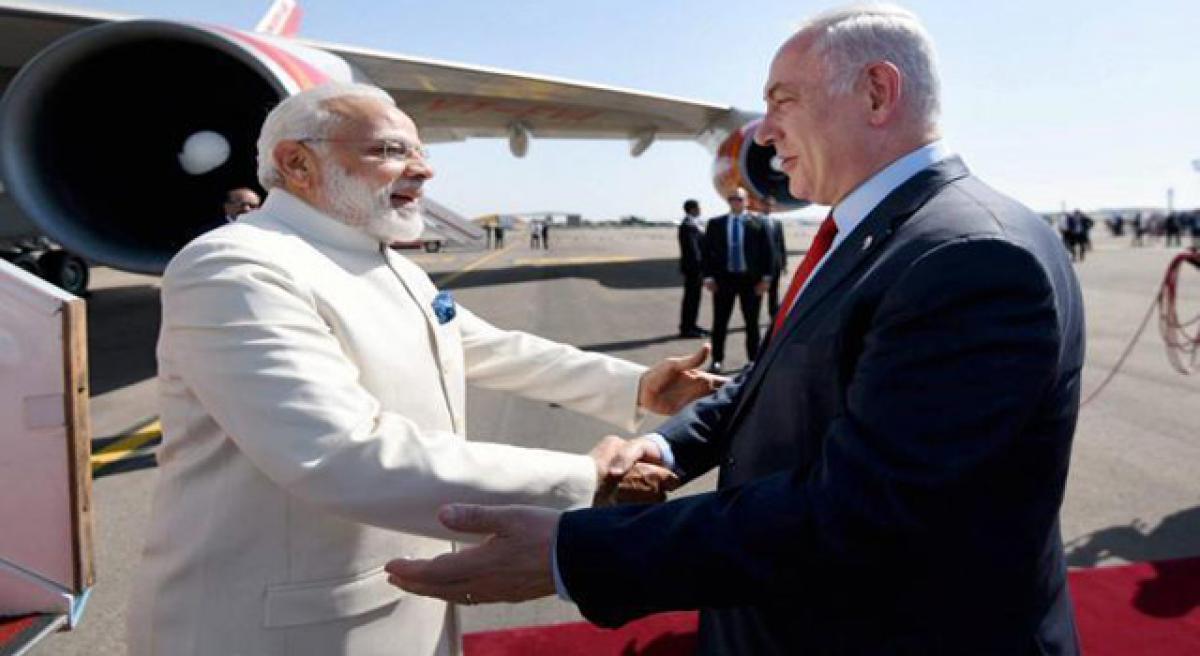Live
- 11 lakh BPL cards revoked, claims K’taka BJP
- Exit polls results indicated victory of the NDA government in Maharashtra and Jharkhand!
- Deputy CM Bhatti Vikramarka Reviews SC/ST Development Funds Implementation
- AP cabinet approves key decisions, check here
- Maharashtra records 58.22 pc turnout, Independent candidate dies of heart attack in Beed
- Manipur: Mobile internet suspension extended for 3 days in 7 districts, curfew relaxed in 4 districts
- EPFO adds 18.8 lakh members in September as employment rises
- ‘Criticise me, not Rabindranath Tagore’, says Assam CM on renaming Karimganj
- Bihar govt launches Ayushman Vandan Scheme
- Infighting again erupts in Trinamool on chair of West Bengal Medical Council
Just In

Narendra Modi’s visit to Israel, first ever by an Indian Prime Minster is indeed an historic event, for both countries. Modi was given the top-most reception with the ‘highest protocol team’ led by Israel Prime Minister Netanyahu himself. Such honour has been extended only to the Pope and the US President.
Narendra Modi’s visit to Israel, first ever by an Indian Prime Minster is indeed an historic event, for both countries. Modi was given the top-most reception with the ‘highest protocol team’ led by Israel Prime Minister Netanyahu himself. Such honour has been extended only to the Pope and the US President.
Modi stayed at the same luxury suite at the King David hotel that Trump was put up. So, apparently the Israelis consider Modi’s visit very significant, taking place in a “changing paradigm and changed architect” of international politics, as suggested by Mark Sofer, an important official in Israeli establishment and a former ambassador to India.
On the Indian side, Modi too did a few firsts. He did not go to Palestine as Indian leaders had done in the past. India is treating Israel-Palestine relation as a de-hyphenated one. New Delhi also seems to treat this visit, important inasmuch as it wants to bring its Israel friend from the closet to be the closest ally. Foreign policy commentators are remarking that, “we should know who our friends are in international politics and Modi is doing just that.”
India’s policy towards Israel suffered from a mismatch between national interests and international role it would have liked to play. This has been the burden of “Nehruvian foreign policy”; Nehru’s idealism took precedence over pragmatism. This is evident from several lapses in the country’s foreign policy in the past, including towards Israel. India voted against the UN resolution on the creation of Israel on 29 November 1947.
On May 1948, Israel was created. After two years, on 17 September 1950, New Delhi recognised it, but did not give it diplomatic contact. It took 42 years for India to have the diplomatic ties. New Delhi was wary of the reactions of Arab countries in dealing with Tel Aviv, but by 1992, many Arab nations had recognised Israel.
In fact, the story in foreign policy circles is that an Indian diplomat asked Narasimha Rao, in exasperation: “Shall we wait for every Arab country to recognise Israel before we set up diplomatic ties?” Prime Minister Narasimha Rao saw the point and relented. Prime Minister Nehru was guided by anti-imperialism, anti-colonialism, and Third World solidarity.
He was averse to any close ties with the colonial west, and Israel was veering to it. History has it that Nehru spurned the request made by Israel through Albert Einstein to support formation of the country in the United Nations. At the same time, Nehru sought Israel military support during China’s invasion in 1962. Israel’s first Prime Minister David Ben Gurion refused initially as Nehru wanted no Israeli flag on the arms supplies, but when Nehru agreed, the arms and ammunitions were promptly sent from Israel. Again, in 1971 war with Pakistan, when India asked Israel for support, it promptly diverted the arms that were being shipped to Iran.
Again, when New Delhi conducted the nuclear tests in 1998, major countries including the US and Japan, imposed sanctions, but Israel didn’t join them. Next year in 1999, Kargil war, Israel again rushed military equipments India urgently needed, and following the war, Tel Aviv helped improve India’s military intelligence and surveillance critical to anti-terrorist operations.
Another milestone in the bilateral relations was the visit of Ariel Sharon in 2003, the first by the Israel head of state, when the Delhi Statement of friendship and co-operation was signed. Since then, there have been many high-level visits from both countries including the Indian President in 2015 and the Israeli President Reuver Rivlin this year.
The current India-Israel bilateralism is based on two main pillars; defence, and agriculture. Some commentators are, in fact, saying that, in partnership with Israel, India has the chance of fulfilling its age-old slogan ‘Jai Jawan, Jai Kisan.’ In this visit, seven MoUs were signed in agriculture, water, and space cooperation. An innovation fund worth $40 million is sought to be created for joint research etc. A host of other trade issues were also discussed.
Israel is wary of Teheran’s antipathy for the Jewish State. New Delhi wants normal relations and a gas pipeline from Iran. When push comes to shove, New Delhi has to make a choice – between petroleum and renewable or nuclear energy. Accordingly, it can identify or discard allies.
The second thorn in the flesh is the so-called ‘Islamic Terrorism.’ If India moves closer to Israel it may incur the animosity from terrorist organisations not only from Pakistan, but from other Islamic countries too. How far this theory is plausible is a matter of solid evidence on the origin of terrorism. So far, it is all coming through or from Pakistan. To the world, for now it seems, Israel is the closest friend of India. (INFA)
By D K Giri

© 2024 Hyderabad Media House Limited/The Hans India. All rights reserved. Powered by hocalwire.com







